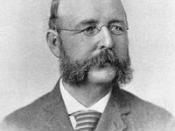The Critical Analysis of Leper Lepellier In a time of war, people can experience a variety of posttraumatic stress disorders. Personality disorders and personality changes are among the most common. These personality changes prevent people from resuming the lives they had before the trauma caused by war. Not only is this evident among our World War II veterans, it is evident in John Knowles' A Separate Peace. The character of Leper displays this characteristic after he leaves boot camp. In John Knowles', A Separate Peace, the, minor character Leper, experiences a dramatic personality change, due to his traumatic experiences during World War II.
A Separate Peace is broken up into three separate periods; before World War II, During World War II, and after World War II. It is in the pre-war setting that we are able to analyze Leper's mental state before the war.
Leper Lepellier represents a stringent definition of the war isolationist. He does this by keeping mostly to himself and not participating in-group activities. This can be seen as Leper having a traditional outlook on life. ""æa soft-spoken, nature-loving boy, with an old soul"æ"ÃÂ(Http://www.gradesaver.com/classicnotes/titles/richardiii.com Jansen 2 ). This is evident in Leper's absence in many of the boy's activities. "He knew that the boys at Devon were not always very reliable, and certainly he didn't want to take the risk of trying to be friends with them. That could mean being let down, and leper wouldn't be able to handle that "à(http://www.planetpapers.com/Assets/1507.html). As the author of the book, A Separate Peace: The War Within, Hallman Bell Bryant states, "On the day that gene and two-hundred classmates volunteer to shovel snow off the main Railroad tracks, everyone except Leper signs up. Instead, Gene encounters him on a pair of antique touring skis, on his way to take pictures of beaver dams on a stream below the school, in an effort to understand better how the "àbeavers adapt to the winter'"ÃÂ(Bryant 80). One could say that the beavers and Leper share a similar personality before the war but when wartime comes the beavers conform and Leper does not. This adaptation can be seen as a foreshadowing for Leper in his later life. Bryant also states, "Leper himself will be victim of the changed climate of war and peace; he, ironically, will not be able to adapt to the coming winter as well as the beavers"ÃÂ(Bryant 80).
A sharp contrast can be seen between Leper and Gene through their actions and reactions to life before and after the war. Leper's friend Gene, one of the main characters, is a sharp contrast to Leper. Bryant states, "Genes Jansen 3 foreboding is contested to the naÃÂïve Leper Lepellier, always unaware and unprepared- the person, Gene says, "ÃÂwho was most often and most empathically taken by surprise, by this and every other shift in our daily life at Devon"ÃÂ(Bryant 80). Leper is a ""æ naturalist. This gentle hobby extracted virtually no interest from the reader, beside the knowledge of lepers eccentric and lonely personality"ÃÂ(http://www.planetpapers.com/assets/2857.html 1). This eccentric Personality, leads Leper to realize that he could become more of an individual by being the first to enlist in the army.
As the war came to Devon, Leper uses this opportunity to enhance his individualism by being the first to sign up for the army. "Through Leper's enlisting, the boys find a way to bring the war to Devon"à(http://www.planetpapers.com/assets/2857.html 1). By enlisting in the army, Leper believes that he is reaffirming his individuality but in actuality, he is sealing his own fate. When Leper arrives in boot camp, he is confronted by the harsh reality of the conformist society he has joined. Through Lepers reactions, when he arrives at boot camp Knowles' implies that even though Leper is a "solitary at school,"àeven he, ""æis crushed by the tighter discipline practiced by the army"ÃÂ(Wolf 260). During boot camp, Leper slowly loses his grip on reality as the confining atmosphere of discipline surrounds him. The army's organization and strict routine wrecks Lepers sanity causing him to gain insight ""æLeper has had a Jansen 4 mental breakdown as a result of the traumatic experiences caused by basic training camp"ÃÂ(Bryant 90). This collapse begins the downward spiral, which leads to Lepers eventual escape. With all the pressure that Leper is under it is surprising that his mental individuality allows him to survive even the first day of basic training. "Leper was reduced to near psychotic conditions by the pressures of military life"ÃÂ(Bryant 91). Leper's condition got worse with each passing day. The armies de-humanizing process was taking its tole on Leper, instilling in him a routine that would stay with him until the end of his life; this caused Leper to go AWOL, (Absent Without Leave).
Leper arrives home in a psychotic state brought on by his experiences in boot camp. His behavior has a sharp contrast to his personality before the war. He is imprinted with the strict routine of the army, which causes him to seek out order and absolute consistency. "The dining room has become Lepers sanctuary because it is the only place where're he can figure out what to do, and "ÃÂ not wonder what is going to happen'. He can rely on his mother serving him three meals a day. Mechanical routines and functional acts such as eating have become a psychological crutch to him."ÃÂ(Bryant 91). When Gene learns of Lepers escape, he goes to visit him in Vermont. When Gene arrives, he is confronted by the horrific truth of what has happened to his friend. "Gene first notices how serious Lepers condition is when Leper confesses that he has gone AWOL in order to avoid being discharged, as the army says, psychologically unfit for Jansen 5 Military service"ÃÂ(Bryant 91). Bryant also states, "in his treatment of Leper, Knowles shows a keen insight into disordered mental states; in his tautly drawn scene he reveals several interesting points that bare on Lepers condition"ÃÂ(Bryant 92). This after-war personality contrasts greatly with his pre-war individuality. It has become impossible for Leper to create a new identity or retrieve his old one because of the mental torture he received either in boot camp or in war, which causes Leper to realize that the strong sense of individuality he once had was his no longer.
In John Knowles' book, A Separate Peace, the minor character Leper, undergoes a significant change during his time at war. As a result of Leper's experiences at boot camp, his original mind state is distorted to one of psychosis. As leper strives to keep his individuality during war, his only success is sinking into the depths of madness. When Leper returns home he finds himself imprinted with the strict routine of war, making him unable to return to the individual he once was. It is through John Knowles' character Leper Lepellier that he shows the effects that war can have on a person's sense of self.
Works Cited Page 1. "A Separate Peace: Character Sketch of Leper Lepellier"ÃÂ. Planet Papers. Apr. 2001 http://www.planetpapers.com/Assets/1507.html 2. Bryant, Hallman. A Separate Peace: The War Within. Boston: Twain Publishers, 1998 3. "Classic Note on Richard III."ÃÂ Grade Saver. June 2000.
Http://www.gradesaver.com/classicnotes/titles/richardiii.com 4. Leper Lepellier's Functions as a Minor Character"ÃÂ. Planet Papers. Apr. 2001. 5.Wolf, Peter., ed. Contemporary Literary Criticisms vol.26. Detroit: Gale Research Co. 1973





